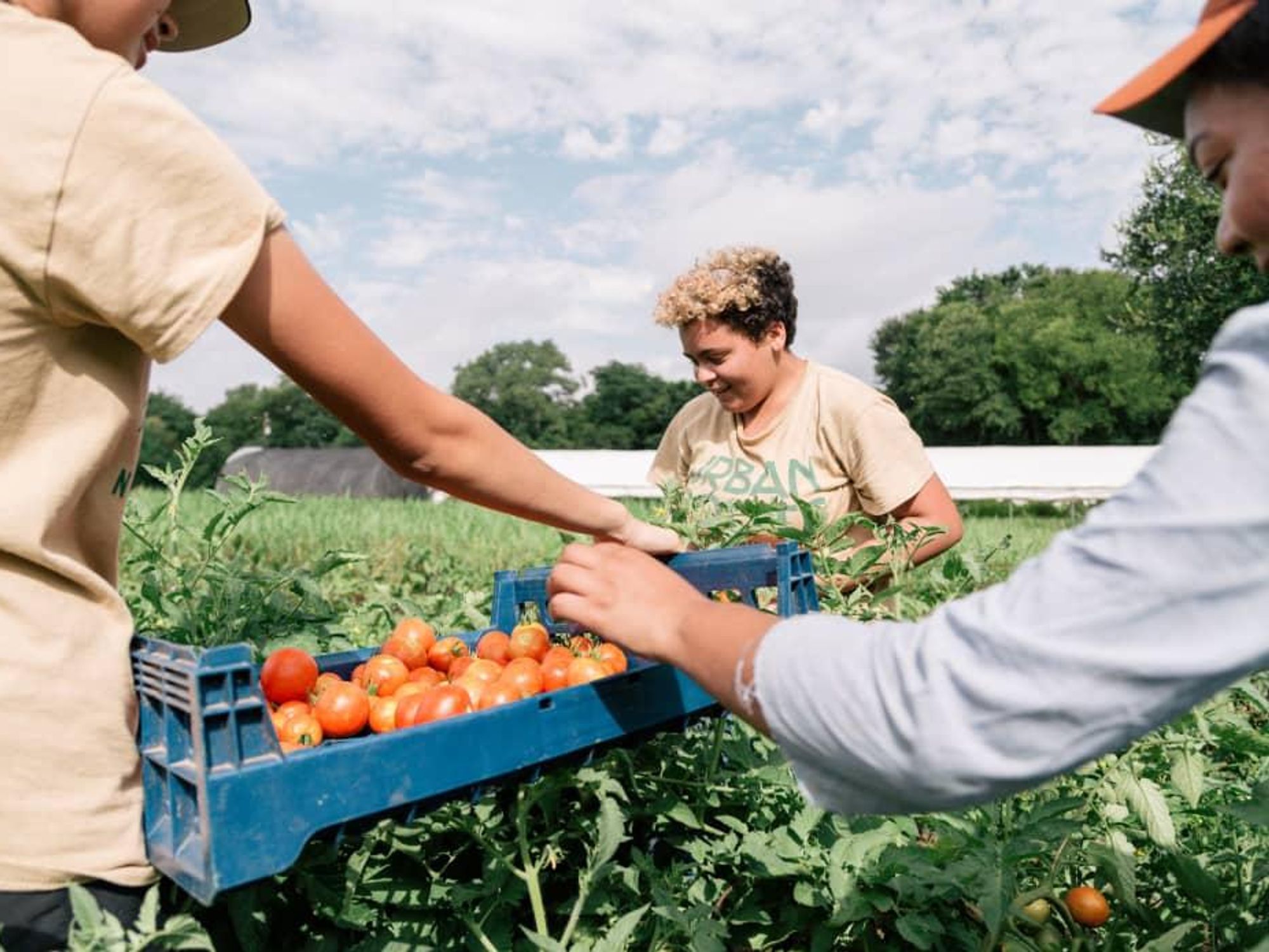Farm Fresh
Essential Austin nonprofit finding new ways to nourish community amid COVID-19

Tune into the Urban Roots Instagram feed and you’ll find a new series of videos featuring executive director Max Elliott teaching viewers how to plant peppers; showcasing his ready crop of kale and the helpful, aphid-eating ladybug larvae that live on the leaves; or interviewing (at a safe distance) local restaurant business leaders. His tone is even and hopeful, a brief lifeline to those of us battling isolation as the COVID-19 outbreak wears on.
In 2008, Elliott founded Urban Roots as a nonprofit farming initiative in East Austin with a mission "to use food and farming to transform the lives of young people and to inspire, engage, and nourish the community.” Over the years, he’s grown the 3.5-acre farming operation to annually support 75 paid internships and fellowships for teenagers and young adults.
Normally, more than 1,000 volunteers pitch in throughout the year to help raise 25,000-plus pounds of food — almost half of which is given away.
April is a peak month for activity at Urban Roots. As the first harvests begin to come in, the farm is usually filled with young people and volunteers learning the tasks, skills, and responsibilities of an organic farmer. Like so many other institutions in the time of COVID-19, however, Elliott has had to quickly reimagine what Urban Roots can do to be of service during this crisis.
“We’re a youth development organization, and our farm is our vehicle for change for these young people to learn the value of meaningful hard work, to learn where food comes from, to learn how to give back to the community," says Elliott. “With this COVID outbreak, we’ve had to pause all of our youth programming.”
As a nonprofit, Urban Roots subsists on a few diverse revenue streams — a combination of grants, farmers market sales, individual and corporate support, and donations from events. Its biggest fundraising event was supposed to happen later this month, but Elliott was forced to cancel the gala.
“That’s about 20 percent of our budget,” he says. “It’s going to be tough. Our fiscal year ends at the end of July, and we’re not going to make that up with produce sales.”
Beyond the funding setbacks, Elliott is faced with another challenge critical to farm operations: a labor shortage. With volunteer and youth initiatives on hold indefinitely, the farm, which has been deemed an essential business by the city, is open only to staff.
“We are, by design, a not-for-profit farm, and so our staff is primarily a bunch of youth development experts,” says Elliott. “So, we’re retooling our team and kind of cross-training so that our staff can continue to work and pull the harvest, and we can continue to serve the community.”
The spring harvest that began in the last few weeks, and is starting to ramp up now, is proving bountiful. Even with new sanitation protocols and a retrained staff, the question for Urban Roots remains how best to put all this produce to use and stay on mission.
“This week is kind of our ‘restaurant week’ so to speak,” says Elliott. “The restaurant community has been so generous and supportive of us over the years. They’ve had to make some really hard decisions to furlough employees, and in the meantime, they’re trying to take care of their employees as best they can and provide food and grocery.
“We harvested about 240 pounds on Tuesday morning to distribute to our friends at La Condesa,” Elliott continues, and he is directing similar harvests to the staffs at Suerte and Launderette later in the week.
With the young people who would normally be working these harvests instead sheltered at home — many in southeast Austin in areas where access to full-service grocery stores is limited — Elliott has a plan to help them as well.
“Next week, we’re going to be harvesting a bunch of produce for our youth participants, distributing food to them and their families,” he says. Some families will come to the farm for produce box pickups, while others with limited transportation options will receive produce delivered directly to their homes.
In keeping with their mission to nourish those in need, a large part of Urban Roots’s harvest would usually go to soup kitchens and other food security donation programs. New precautionary measures in place to prevent the spread of the novel coronavirus have complicated the distribution of produce to these organizations. According to Elliott, the dozen or so hunger relief partners he regularly works with — Caritas, Meals on Wheels, and the Capital Area Food Bank among them — are having to adjust just as quickly as he has in order to continue to offer their services.
“As they adapt to this new landscape, we have to adapt to accommodate their needs as best we can,” he says. “Some organizations aren’t providing the soup kitchens like they did because there’s a greater concern around safety… The emergency food relief system is changing rapidly, and so we have to be in communication [with our partners] to see who can best use the produce, and how we get it to them. So, it’s ongoing.”
As for the larger Austin community, Elliott says that Urban Roots plans to make its first appearance this year at the SFC Downtown Farmer’s Market on Saturday, April 11. While they haven’t offered Community Supported Agriculture (CSA) produce box subscriptions in the past, Elliott is planning to offer pre-packed vegetable boxes going forward.
“All the CSA’s are filled up,” he says, “and so there’s just a huge demand. We’re just going to slowly roll this out and see how it does. We want to get to a place where we’re selling [30 or 40 boxes] a week, as well as donating 30 or 40 a week.” He compares his model to that of TOMS shoes. “You buy a box, and it’s going to support [the donation of another box] that will go to somebody in need.”
Despite the upheaval, and in keeping with his optimistic character, Elliott sees a few bright spots.
“We’re seeing a lot of our other partners like [produce delivery services] Farm to Table and Farmshare thriving,” he says. “We’re seeing a lot of our farmer colleagues thriving. And that’s exciting.”
As other for-profit farms are finding new niches and ways to generate income, the nonprofit landscape remains a scary place for someone in Elliott’s position.
“We aren’t able to have volunteers, and that’s really hard because I know a lot of people want to help out in that way,” he says. “For us to continue to grow food for the community, we would truly appreciate any donations people can make. You can make donations on our website”
With the harvest season beginning in earnest, Elliott finds that farming is even more essential now, not just to those who benefit from the produce coming off his farm, but also to those who are putting in the hard work to get that produce into the community.
“The farm right now is this great refuge for our staff to get recharged, to be outside, to be in a healthy place, to grow food, and to nourish the community and have a sense of purpose,” says Elliott. “For us, it feels like a huge privilege that the best thing we can do for Austin right now is to continue to grow food.”
